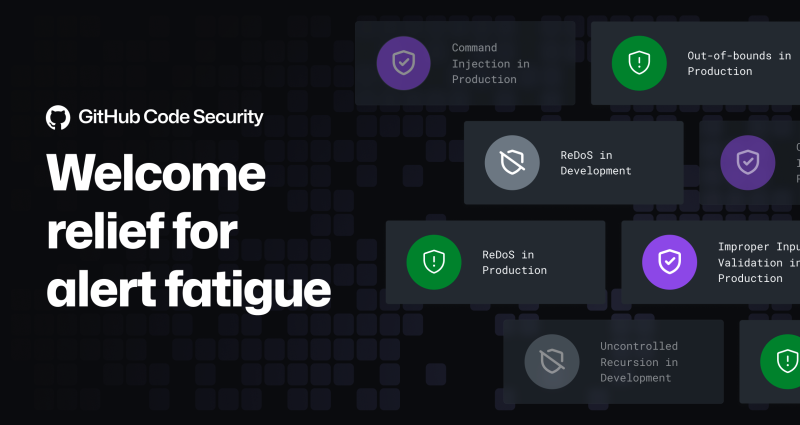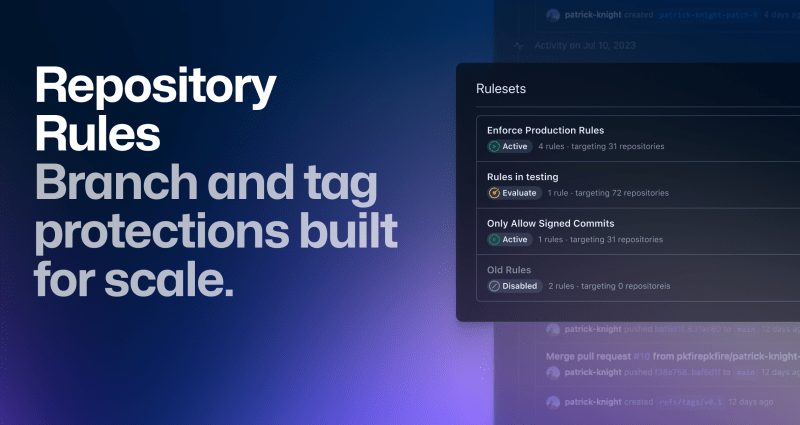

A faster way to manage version updates with Dependabot
source link: https://github.blog/2023-08-24-a-faster-way-to-manage-version-updates-with-dependabot/
Go to the source link to view the article. You can view the picture content, updated content and better typesetting reading experience. If the link is broken, please click the button below to view the snapshot at that time.

A faster way to manage version updates with Dependabot
Now, you can group multiple version updates in a single pull request.

When the next Log4j lands, you don’t want to find out that you’re several versions behind, and that it’s going to take the team days to fix all of the breaking changes. Dependabot version updates automate the patching process, giving you a measure of protection from unwelcome surprises.
But just as with any inbox, the sheer volume of available updates can quickly swell into a management hassle. And given that some types of related dependencies must be updated together–such as with Storybook, Angular, and AWS SDK–it’s all too easy to put off these tasks until it’s too late.
Today’s general availability release is all about making it easier to stay on top of version updates and prevent breaking changes. Previously, Dependabot would open individual pull requests for each update, adding overhead to a developer’s workflow and raising the possibility that related dependencies could fall out of sync. Now, you can specify groups of dependencies to update with a single pull request. Grouped version updates confer significant benefits to your development process: simplified dependency management, a reduced risk of breaking changes, and an opportunity to phase out third-party tools and manual workarounds.
I’ve been testing the grouped Dependabot updates and just wanted to say it is awesome! Grouping functionality and configuration are exactly what we want.
- Nick Gibson, Causeway Capital Management
How it works
To take control of how Dependabot structures its pull requests, you can define groups of dependencies that will be updated together using groups in dependabot.yml. For example, you can configure groups that update many dependencies at once, or groups that minimize the risk of breaking changes.
When you first configure a group, specify a group name that will display in pull request titles and branch names. Then, define other options to include or exclude specific dependencies from the group.
dependency-type: specify a dependency type to be included in the group. dependency-type can bedevelopmentorproduction.patterns: define strings of characters that match with a dependency name (or multiple dependency names) to include those dependencies in the group.update-type: specify the update type based on semantic versioning (for instance, where 1.2.3 equates to major.minor.patch) to include all updates of the same level in the same group.
You can also exclude dependencies from groups to always manage their updates individually:
exclude-patterns: define strings of characters that match with a dependency name to exclude them from a group. For these dependencies, Dependabot will continue to raise single pull requests to update the dependency to its latest version.
Bear in mind that you can only create groups for version updates.
Example 1: Group by dependency-type
In this example, “production” and “development” dependencies are grouped together, excluding those that match the pattern “rubocop*”:
# `dependabot.yml` file using the `dependency-type` option to group updates
# in conjunction with `patterns` and `exclude-patterns`.
groups:
production-dependencies:
dependency-type: "production"
development-dependencies:
dependency-type: "development"
exclude-patterns:
- "rubocop*"
rubocop:
patterns:
- "rubocop*"
Example 2: Group by patterns
In this example, a group named dev-dependencies will update dependencies in the bundler ecosystem at a weekly interval:
# `dependabot.yml` file with customized bundler configuration
# In this example, the name of the group is `dev-dependencies`, and
# only the `patterns` and `exclude-patterns` options are used.
version: 2
updates:
# Keep bundler dependencies up to date
- package-ecosystem: "bundler"
directory: "/"
schedule:
interval: "weekly"
# Create a group of dependencies to be updated together in one pull request
groups:
# Specify a name for the group, which will be used in pull request titles
# and branch names
dev-dependencies:
# Define patterns to include dependencies in the group (based on
# dependency name)
patterns:
- "rubocop" # A single dependency name
- "rspec*" # A wildcard string that matches multiple dependency names
- "*" # A wildcard that matches all dependencies in the package
# ecosystem. Note: using "*" may open a large pull request
# Define patterns to exclude dependencies from the group (based on
# dependency name)
exclude-patterns:
- "gc_ruboconfig"
- "gocardless-*"
Example 3: Group by update-type
groups:
angular:
patterns:
- "@angular*"
update-types:
- "minor"
- "patch"
ignore:
- dependency-name: "@angular*"
update-types: ["version-update:semver-major"]
Who can use this feature
People with permissions for a repository can configure Dependabot groups for that repository.
Learn more about grouped updates
The GitHub Insider Newsletter
Discover tips, technical guides, and best practices in our monthly newsletter for developers.
SubscribeMore on Dependabot

Dependabot relieves alert fatigue from npm devDependencies
A new alert rules engine for Dependabot leverages alert metadata to identify and auto-dismiss up to 15% of alerts as false positives.
3 ways to meet compliance needs without slowing down agility
Learn how to enable developer productivity and collaboration while staying secure and compliant. Stay compliant without slowing down your business. From security to CI/CD, automate every step of your software workflow—so your developers can stay focused on what matters most: building.
Unlocking security updates for transitive dependencies with npm
How Dependabot integrated with npm to address security vulnerabilities on transitive dependencies and increase the likelihood of success for JavaScript security updates by 40%.
More on supply chain security

GitHub Repository Rules are now generally available
Repository rules provide an easy, flexible way to define branch protections and ensure consistency in code across repositories.
Dependabot relieves alert fatigue from npm devDependencies
A new alert rules engine for Dependabot leverages alert metadata to identify and auto-dismiss up to 15% of alerts as false positives.
Private vulnerability reporting now generally available
Open source maintainers and security researchers embrace a new best practice to report and fix vulnerabilities.
</div
Recommend
About Joyk
Aggregate valuable and interesting links.
Joyk means Joy of geeK